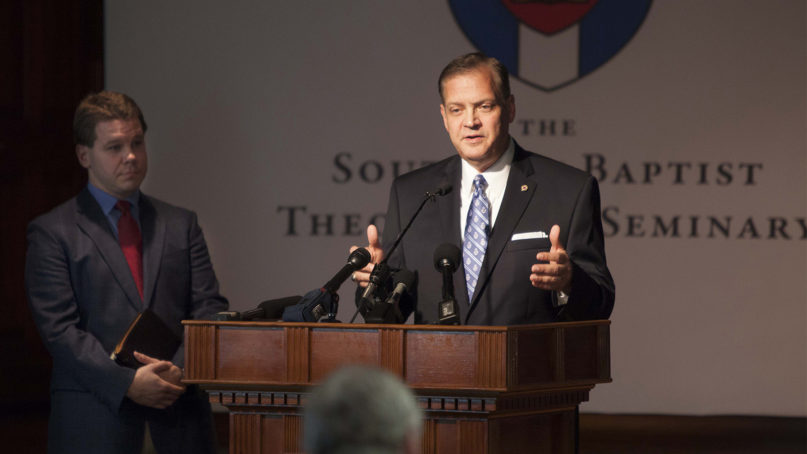(RNS) — On the campus of the Southern Baptist Theological Seminary in Louisville, Kentucky, a gift shop named for the school’s former president Edgar Young Mullins offers a selection of men’s blazers, watches, bags and fine writing instruments.
Edgar’s men’s emporium complements a core function of the seminary since its founding in 1859: to turn country preachers into Christian gentlemen. This is accomplished through intellectual growth and spiritual formation, of course, but the proper accoutrements never hurt.
The shop also evokes the style of the Rev. R. Albert Mohler, who has graced the seminary with his intellect and devotion since he became president in 1993. Fundamentally old-fashioned, he sends handwritten letters. Even the logo on his website depicts the nib of a fountain pen.
Make no mistake, Mohler is also savvy in the ways of modern media. He produces a prodigious amount of content, including a popular daily podcast. Mohler has been in so many ways the ideal of the Christian gentleman SBTS holds up: clear in his convictions, intellectually honest and a living exemplar for thousands of Southern students.
Thus it was no surprise that when President Donald Trump’s political clown show, dripping with anti-elitism and fueled by white nativism, took over the Republican Party beginning in 2015, Mohler wanted nothing to do with it.
He wrote in The Washington Post, “Public arguments that cover for Donald Trump are now not only implausible but excruciating.”
But as Trumpism became a force in GOP politics, an influential subset of Southern Baptists let it be known they were incensed at denominational leaders’ initial refusal to embrace the president. By April of this year, Mohler had evolved, not only acknowledging that Trump had kept his promises on judicial nominations, but publicly regretting having ever opposed Trump at all.
Mohler’s capitulation was hardly remarkable at the time; most of the SBC elite had come around or were silenced. Then, in the past month, staunchly conservative Calvinist pastors John Piper and Tim Keller declined to endorse Trump, and it seemed to strike Mohler hard. Piper’s blog post, in particular, was devastating in its implications for the ruined integrity of evangelical Trump disciples.
On Oct. 26, Mohler published a 3,700-word defense of his vote for Trump. His harshest words were directed at a group called Pro-life Evangelicals for Biden, calling it an “insanity” that is “more than I can deal with here.” Justifying Trump’s “sad” deficiencies when it comes to moral virtue, Mohler wrote, “I still believe in the necessity of character for public office, but I have had to think more deeply about how character is evaluated in an historic context.”
But the most revealing admission is Mohler’s view of how white and black Christians will vote in this election. Black Americans have voted predictably for the Democratic Party since 1960, Mohler acknowledges. “Like the pattern of white evangelical voting, this is not a surprise. There are long historical reasons why both are so.”
Giving Black Americans a pass on voting for Trump while supposing that whites have no other option, Mohler doubles down on these “historical reasons” for America’s racial divides. He can’t ask them to abide Trump’s racism, but he expects white evangelicals to let it slide. Conceding that he would rather live down the street from Joe Biden than Trump because “I like a quiet neighborhood,” he goes on to talk about the difference politics makes “in the communities we build.”
It’s a stunning picture: The de facto leader of a denomination founded on slavery — a denomination that was working hard on “racial reconciliation” when Trump rode down that escalator in June 2015 — pushing away nonwhite Christians in order to cozy up to a president who built his rise to the White House on the racist delegitimization of America’s first Black president.
In years to come, when we wonder why the Southern Baptist Convention is still a bastion of white Republicanism, continually out of step with nonwhites, we will look back to Mohler’s Trump support and say: There are long historical reasons why it is so.
Sometimes I think Mohler is unfairly attacked. But I have lost some respect for him as a religious leader.
Trump, of course, never respected him and sees him only as a useful idiot. On Saturday night, Trump shared Mohler’s apologia on his Twitter page, in between an endless stream of casual race-baiting and active wishes to subvert the democratic process.
Thank you @albertmohler for your vote of confidence. You and I agree we can never compromise on Religious Liberty. #BeliversandBallots get to the polls and vote to protect Religious Liberty! https://t.co/MiucOF3KIs
— Donald J. Trump (@realDonaldTrump) November 1, 2020
Trump’s coterie of “faith advisers” is mostly made up of hucksters, charlatans, publicity hogs and grifters. They are a peripatetic parody of themselves, and not one member of the Trumpist clergy offers a religious message I would take seriously for a moment. They sold their birthright for a mess of pottage and ought to take the gospel of Jesus Christ out of their mouths until they repent of the damage they’ve done to his name.
Mohler is not one of that group, or quite on their level. But I hope he counts the cost of what he has done. Trump’s desecration of the presidency and perversion of public discourse make Bill Clinton look like, well, a Southern Baptist seminarian by comparison.
Nor do I think Mohler is a racist. He’s a larger-than-life figure whose influence will last long after he is gone. I will continue to regard him as a most important evangelical public intellectual. I will happily engage and respond to his ideas about matters of culture and public policy.
No one will forget Mohler’s defense of this president. Supporting Trump is beneath the dignity of a Christian scholar, a Christian pastor or a Christian gentleman.
(Jacob Lupfer is a writer and political strategist based in Baltimore. The views expressed in this commentary do not necessarily reflect those of Religion News Service.)





